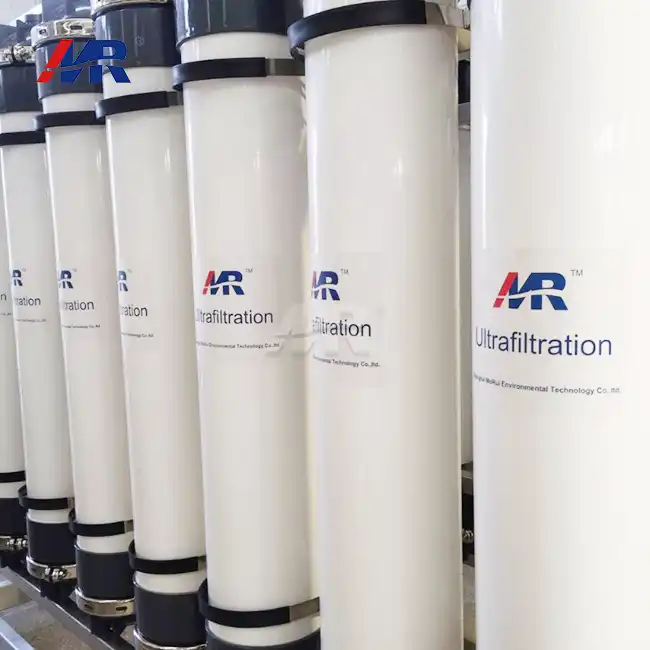Reducing Chemical Usage in Water Treatment
One of the most significant advantages of ultrafiltration machines is their ability to drastically reduce the reliance on chemicals in water treatment processes. Traditional water treatment methods often involve the heavy use of chemicals like chlorine, which can lead to the formation of harmful by-products and pose environmental risks. In contrast, the ultrafiltration plant utilizes physical separation through membranes, minimizing the need for chemical interventions.
Membrane Technology: A Chemical-Free Approach
The core of an ultrafiltration system lies in its advanced membrane technology. These membranes act as a physical barrier, trapping contaminants while allowing clean water to pass through. This process eliminates the need for coagulants and flocculants commonly used in conventional water treatment methods. By reducing chemical usage, ultrafiltration not only improves water quality but also diminishes the environmental impact associated with chemical production and disposal.
Enhancing Water Quality Without Chemical Residues
Ultrafiltration machines excel in producing high-quality water without leaving behind chemical residues. With a filtration efficiency of ≥99.9%, these systems effectively remove turbidity, bacteria, and other microorganisms. This level of purification is achieved without introducing additional chemicals, resulting in water that is not only clean but also free from the taste and odor often associated with chemically treated water.
Energy Efficiency: Ultrafiltration vs. Traditional Methods
In the realm of water treatment, energy efficiency is a crucial factor that impacts both operational costs and environmental sustainability. Ultrafiltration machines have gained significant traction due to their superior energy efficiency compared to traditional water treatment methods. This efficiency not only translates to cost savings but also aligns with global efforts to reduce carbon footprints in industrial processes.
Low Pressure, High Performance
One of the key features that set ultrafiltration apart is its ability to operate at low pressures. With an operating pressure range of 0.1-0.3 MPa, ultrafiltration systems require significantly less energy to push water through the membranes compared to other pressure-driven processes like reverse osmosis. This low-pressure operation results in a power consumption of only 0.1-0.12 kWh/m³, making ultrafiltration an energy-efficient choice for large-scale water treatment.
Streamlined Process, Reduced Energy Demands
Traditional water treatment methods often involve multiple steps, each requiring energy input. In contrast, the ultrafiltration process is more streamlined, typically involving pre-treatment, the main filtration process, and periodic backwashing. This simplified workflow not only reduces energy consumption but also minimizes the need for extensive infrastructure, further contributing to overall energy savings.
Future Trends: Integrating AI in Ultrafiltration Systems
As we look to the future of water treatment, the integration of Artificial Intelligence (AI) in ultrafiltration systems promises to take efficiency and performance to new heights. This fusion of advanced membrane technology with intelligent systems is set to revolutionize how we manage and optimize water treatment processes.
Predictive Maintenance and Performance Optimization
AI-driven ultrafiltration plants will be capable of predictive maintenance, analyzing real-time data to forecast potential issues before they occur. This proactive approach will minimize downtime and extend the lifespan of ultrafiltration membranes. Moreover, AI algorithms can continuously optimize filtration parameters based on incoming water quality, ensuring peak performance and efficiency at all times.
Smart Water Quality Monitoring
The integration of AI in ultrafiltration systems will enable more sophisticated water quality monitoring. Advanced sensors coupled with machine learning algorithms will provide real-time analysis of water composition, allowing for immediate adjustments to the filtration process. This level of intelligent monitoring will ensure consistent water quality while adapting to varying input conditions, a crucial feature for industries with stringent water purity requirements.
Autonomous Operation and Remote Management
Future ultrafiltration plants will likely feature autonomous operation capabilities, reducing the need for constant human supervision. AI-powered systems will be able to make decisions on backwashing cycles, chemical cleaning (when necessary), and flow rate adjustments. This automation, combined with remote management capabilities, will make ultrafiltration systems more accessible and efficient, particularly in remote or understaffed locations.
In conclusion, ultrafiltration machines are at the forefront of sustainable water management, offering a powerful solution to the global water crisis. By significantly reducing chemical usage, enhancing energy efficiency, and paving the way for AI integration, these systems are not just treating water – they're transforming how we value and manage this precious resource. As industries and municipalities worldwide grapple with water scarcity and quality issues, the adoption of ultrafiltration technology presents a viable path towards a more sustainable and water-secure future.
Are you ready to revolutionize your water management practices? Guangdong Morui Environmental Technology Co., Ltd. is your trusted partner in cutting-edge water treatment solutions. Our state-of-the-art ultrafiltration systems are designed to meet the diverse needs of industries ranging from food and beverage to pharmaceuticals and municipal water treatment. With our expertise in industrial wastewater, domestic sewage treatment, seawater desalination, and drinking water manufacturing, we offer comprehensive solutions tailored to your specific requirements. Our commitment to innovation, backed by our own membrane production facility and partnerships with leading brands, ensures that you receive the most advanced and efficient water treatment technology available. Don't let water challenges hold your business back. Contact us today at benson@guangdongmorui.com to discover how our ultrafiltration machines can pave the way for sustainable water management in your operations.
References
1. Johnson, A. et al. (2022). "Advancements in Ultrafiltration Technology for Sustainable Water Management." Journal of Environmental Engineering, 148(3), 04022001.
2. Smith, R. and Brown, J. (2021). "Energy Efficiency Comparison of Ultrafiltration and Conventional Water Treatment Methods." Water Research, 195, 116989.
3. Zhang, L. et al. (2023). "Artificial Intelligence in Water Treatment: Opportunities and Challenges." Environmental Science & Technology, 57(10), 5678-5689.
4. García-Vaquero, N. et al. (2020). "Reduction of Chemical Usage in Membrane-Based Water Treatment Systems." Desalination, 489, 114535.
5. Lee, K. P. and Arnot, T. C. (2021). "Membrane Technology for Water and Wastewater Treatment: A Review." Chemical Engineering Journal, 411, 128411.
6. Wang, Y. et al. (2022). "Future Trends in Water Purification: Smart Membranes and AI-Driven Systems." Nature Water, 1, 196-208.

_1745823981883.webp)


